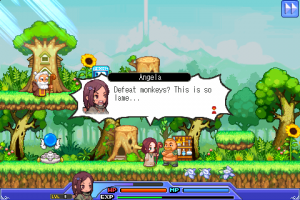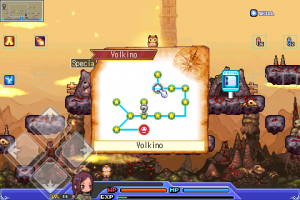Imagine, if you will, the Lone Ranger’s horse trotting up to a besieged town desperately in need of a savior…only the rider isn’t Clayton Moore with a mask slapped over his brow, but rather a child in an adorable rabbit outfit who carries sword or staff in hand. That’s how things work in Aztaran, where demonic forces spewing out of a mysterious tower have neutralized most able-bodied adults, and where every pre-teen capable of bearing a weapon dreams of suiting up into the latest cute Halloween costume and setting things aright. Two such adventurers – the mage Angela and the plucky lil’ swordsman Arez – are under the player’s control as they journey from village to village, undertaking quests that will gradually unravel the evil poisoning their land.
Illusia‘s story is pretty sparse beyond dialogue needed to set up and resolve the string of quests Angela or Arez are asked to complete, but its text quality is generally impeccable. There’s a rare misspelling here and there, although these turn out so hilarious it’s difficult to tell whether they’re actually typos or if Gamevil’s translation team snuck in some clever puns.
 Despite Illusia‘s subtitle, there’s nothing too casual about this Platform Action RPG other than its tight pick-up-and-play interface. There’s enough heft in both its platforming and RPG aspects to keep long-time fans of either genre engaged. Illusia‘s RPG elements will feel especially familiar to fans of Zenonia; all the usual Gamevil trappings are here, including virtual button-navigated menus, hotlinked buttons for special attacks and item usage, and forging. This time around stat points awarded after Level Ups can be assigned to the player character’s stats manually or entrusted to automatic distribution if the player wants to save time on micromanagement.
Despite Illusia‘s subtitle, there’s nothing too casual about this Platform Action RPG other than its tight pick-up-and-play interface. There’s enough heft in both its platforming and RPG aspects to keep long-time fans of either genre engaged. Illusia‘s RPG elements will feel especially familiar to fans of Zenonia; all the usual Gamevil trappings are here, including virtual button-navigated menus, hotlinked buttons for special attacks and item usage, and forging. This time around stat points awarded after Level Ups can be assigned to the player character’s stats manually or entrusted to automatic distribution if the player wants to save time on micromanagement.
Okay, so we’ve largely been there and done that on the iOS. Where Illusia‘s real pleasant surprise lies is in its excellently designed platforming. Guiding the hero or heroine around their environments gave me flashbacks to classics like the elder Castlevania titles; areas have to be navigated vertically as well as horizontally via all manner of stepping stones and trap-filled platforms. Less-than-careful attention to the game’s physics is sure to set the player back every now and then, but Illusia is forgiving in two respects: both Angela and Arez come with a double jump ability out-of-the-box, and mere contact with enemies won’t push the player character off platforms or result in automatic injury — something sidescrolling veterans will surely appreciate.
 A navigation map for the area surrounding a given town can be summoned via virtual button, and while it might strike the player as a dolled up version of the legendary “Castleroid” map at first, getting from Point A to Point B tends to get pretty complex in Illusia. Area exits alternate between natural screen transitions and teleporters or boss room doors that must be sought out atop an environment’s highest platforms. Quests that further the story must be completed one by one, which means plenty of trotting back and forth between towns and surrounding areas until the player can consistently afford warp items that allow instantaneous travel. Sidequest opportunities in a particular town don’t end once that town’s story dilemma has been solved, so a special warp gate NPC in each village offers instant travel to previously cleared regions.
A navigation map for the area surrounding a given town can be summoned via virtual button, and while it might strike the player as a dolled up version of the legendary “Castleroid” map at first, getting from Point A to Point B tends to get pretty complex in Illusia. Area exits alternate between natural screen transitions and teleporters or boss room doors that must be sought out atop an environment’s highest platforms. Quests that further the story must be completed one by one, which means plenty of trotting back and forth between towns and surrounding areas until the player can consistently afford warp items that allow instantaneous travel. Sidequest opportunities in a particular town don’t end once that town’s story dilemma has been solved, so a special warp gate NPC in each village offers instant travel to previously cleared regions.
Gameplay differs sufficiently between the two playable characters on offer, following a predictable long-range/short-range dichotomy in terms of their regular attacks and skills – for the most part. In addition to the aforementioned double jump, they share a dash attack and downward-attacking maneuver executed mid-jump.


